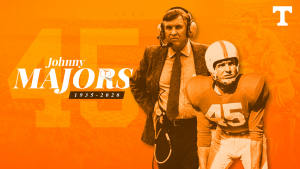
Tennessee football legend Johnny Majors passed away early Wednesday in Knoxville. He was 85.
A 1987 inductee of the National Football Foundation and College Football Hall of Fame, John Terrill (Johnny) Majors played for the Volunteers from 1954-56 and later served as Tennessee’s head football coach from 1977-92.
Majors’ collegiate playing career alone places his among the pantheon of Tennessee’s all-time greats. His No. 45 was retired by his alma mater in 2012—one of only eight to earn that distinction.
Called Johnny “Drum” Majors during his playing days, he did it all for the Vols as a collegian—running, passing, kicking and defending. When they call the roll of the game’s great single-wing tailbacks, Majors stands at or near the top of the list.
A native of Lynchburg, Tennessee, and a graduate of Huntland High School, Majors finished his Tennessee playing career with 1,622 rushing yards and 15 touchdowns on 387 carries while also completing 54.1 percent of his passes (80 for 148) for 1,135 yards and 11 scores. He rushed for 549 yards and seven touchdowns on 108 carries in 1956.
Tennessee was 20-10-1 during his time as a Vol. Majors returned 36 punts for a 12.2-yard average and one touchdown in his career along with 15 kickoff returns for a 22.9-yard average. Majors also intercepted two passes at Tennessee and punted 83 times for a 39.1-yard average.
He earned both SEC Player of the Year honors and All-SEC selection at tailback twice, in 1955 and 1956. A unanimous All-American under coach Bowden Wyatt in 1956, he finished second in the Heisman Trophy balloting after leading the Vols to a 10-1 record, an appearance in the Sugar Bowl and a final national ranking of No. 2.
Majors was named to the Quarter-Century All-SEC team (1950-74) at running back, along with LSU’s Billy Cannon and Alabama’s Johnny Musso. When his Tennessee playing career ended, he ranked in the SEC’s all-time top 10 in total offense (2,757) and rushing (1,622) and was the league’s single-season record holder for completion percentage (61.0 percent in 1956).
The 1957 UT College of Education graduate was selected as Tennessee’s SEC Football Legend in 2002.
“I didn’t know I was a legend,” Majors said at that time. “Whatever my biography may say is good, I know why it happened… I had great support from home, unconditional love from my parents, my siblings, my wife, Mary Lynn, and children.
“I had exceptional coaching as a player from my father, Shirley Majors, and from Harvey Robinson and Bowden Wyatt, and their staffs. No man could have had a better mother than I did in Elizabeth Majors. I had special teammates who were helpful in me being as effective as I might have been. I had no excuses to fail based on the people I just mentioned whatever favorable accomplishments there might have been. I’m not the one to judge that.”
Majors was an assistant coach at Tennessee and Mississippi State before beginning a head coaching career that saw him rebuild programs at Iowa State, Pittsburgh, Tennessee and back to Pittsburgh. He won a national championship at Pitt in 1976. Majors finished with a record of 185-137-10 in 29 seasons of coaching.
Twenty-one years after his playing days were over, Majors came marching home to rebuild Tennessee’s football fortunes, much the way he did at Iowa State and Pittsburgh, and the results indicated that the coaches’ son from Huntland (Franklin County) had not lost his touch. He was 116-62-6 as head coach at Tennessee, with three conference championships (1985, 1989 and 1990) and 12 bowl appearances. He produced 15 All-America selections.
There were more great moments on Majors’ resume than could be recounted in a series of stories. As a player, he was involved in the classic Tennessee-Georgia Tech game in 1956, voted the second greatest game of all time by the Associated Press a few years later. Majors had the key pass completion to Buddy Cruze and sent Tommy Bronson hurdling the line for the game’s only score at the north end of Grant Field in Atlanta.
His 1991 Tennessee team came back from what appeared to be certain defeat in 1991 at Notre Dame, rallying from a 31-7 halftime deficit to take a 35-34 decision. His 1985 team defeated Miami in the Sugar Bowl, 35-7, a game Vol fans remember fondly to this day.
“I can safely say that playing for Johnny Majors was one of the greatest experiences of my life,” VFL and NFL television analyst Charles Davis, a member of UT’s 1985 team, said. “I have literally thought about him in some form or fashion every single day of my life since the first day I got to Tennessee. You’ll never be able to say the word ‘Tennessee’ without the name ‘Majors’ coming up very quickly in your mind. He is Tennessee and Tennessee is him.
“I was just fortunate enough to have played for him, fortunate enough to get to know him not just as a player, but as a person. He’s had a profound influence on my life and always will. I can easily say that I love the man.”
Tennessee Director of Athletics Phillip Fulmer was an assistant coach on Majors’ UT staff from 1980-92.
“It’s a sad day,” Fulmer said. “He gave many of us coaches our start in big-time college football. He mentored us, pushed us and allowed us to be part of the proud resurgence of Tennessee football. He touched and changed many lives for the good, and our thoughts are with his family, former players and great fans who are remembering him today.”
Majors’ list of honors is extensive and includes the Walter Camp Coach of the Year Award, the AFCA Coach of the Year Award, the Sporting News College Football Coach of the Year Award and an SEC Coach of the Year Award. In addition to legendary UT gridiron stars such as Reggie White, Willie Gault, Harry Galbreath and Dale Carter, he also coached Hall of Famer Tony Dorsett, who won the Heisman Trophy in 1976 as he and Majors guided Pitt to the national championship.
The Majors family issued the following statement Wednesday morning:
John Terrill Majors passed away peacefully at his Knoxville home early this morning. He was 85 years old.
“It’s with a sad heart that we make this announcement,” said Mary Lynn Majors, his wife of 61 years. “John passed away this morning. He spent his last hours doing something he dearly loved: looking out over his cherished Tennessee River.”
Majors’ son, John Ireland Majors, recognizes that his father’s legacy extends well beyond the football field. “Dad’s passions and friendships were so diverse. He loved the symphony, travel, history and almost any type of museum.” Mary Elizabeth Majors, his daughter, added, “my dad was a strong and determined person. Our family will all try to live up to that legacy as we mourn his loss – and celebrate his life.”
A memorial service at St. John’s Cathedral will be held at a later date. In lieu of flowers, please consider contributions to the Knoxville Symphony Orchestra or the charity of your choice.
-UT Athletics




















